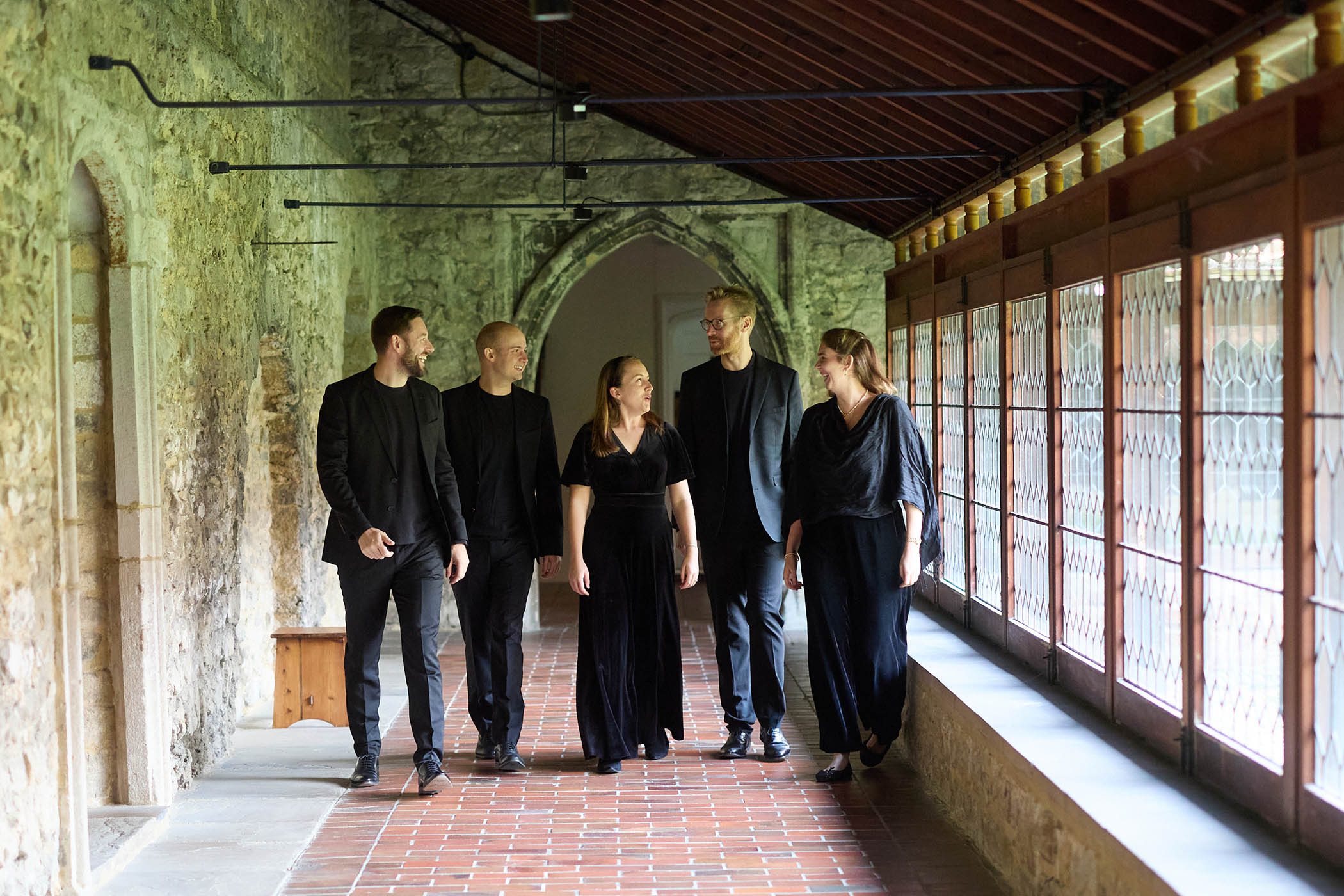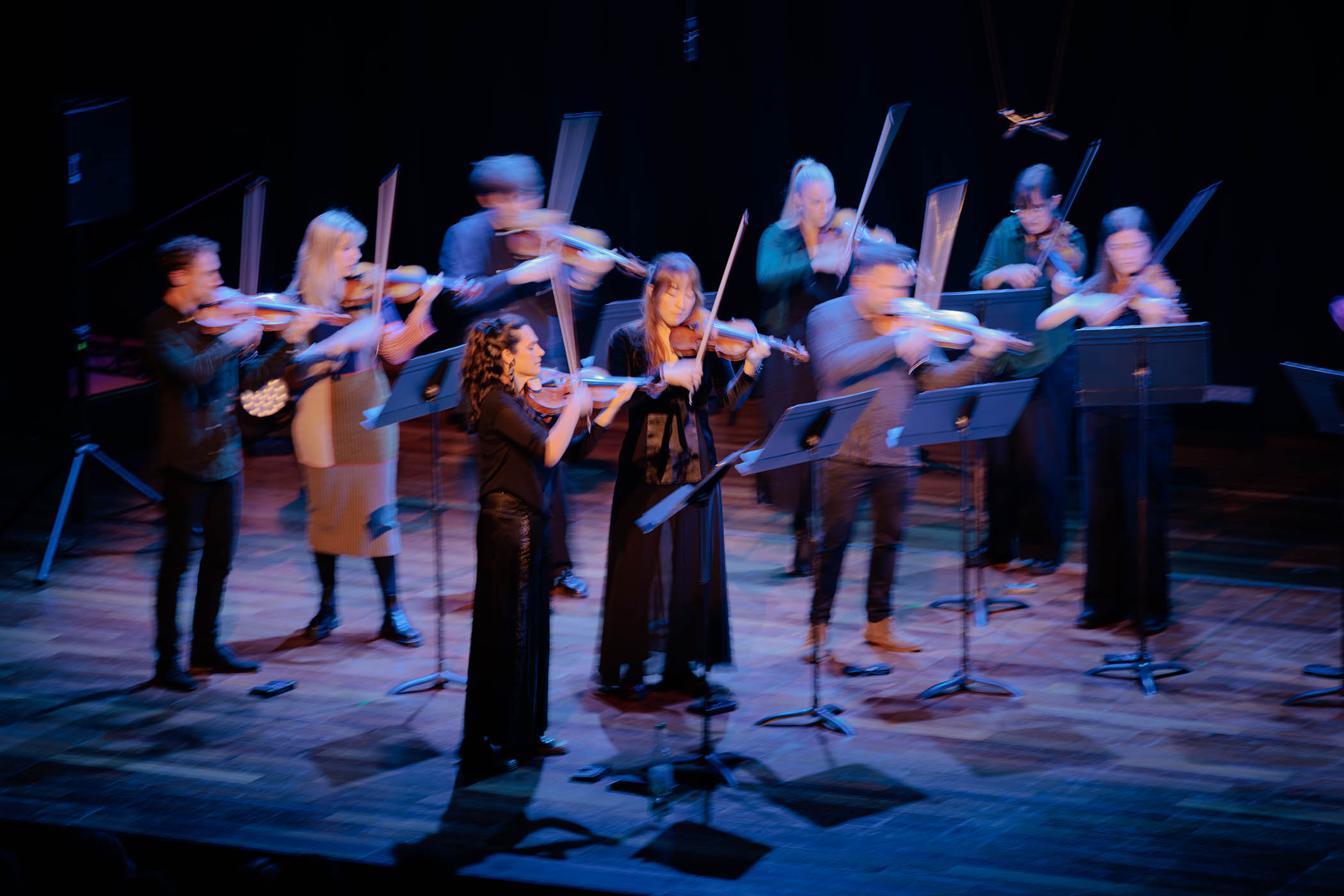Covering all bases, Manchester Collective promised life, death and divine ecstasy in their programme for the Southbank Centre’s season launch last weekend. You could say all music clambers over those rocky abstract nouns. Wagner makes some of us ecstatic while boring others nearly to death. Liszt, in his appearances as pianist-composer, provoked a hysteria so contagious, immunisation was urged. There are countless less clamorous examples. The idea of ecstasy in a spiritual sense is a different matter, immediately felt, not easy to analyse, which matters only to those of us who try.
This virtuosic string ensemble, which changes size as needed, explored their ambitious theme via ideas of memory. In Dobrinka Tabakova’s Such Different Paths, baroque viola da gamba and folk fiddle styles surface as if through frosted glass. Kaija Saariaho’s Terra Memoria recalls the dead through hushed tappings, scratches and ethereal whispers. Manchester Collective’s co-founder and leader, Rakhi Singh, gave illuminating short introductions. We also heard her own persuasive arrangement of the hymn Veni Creator Spiritus, beloved of composers from Bach and Mahler (in his “Symphony of a Thousand” No 8) to Stockhausen and Arvo Pärt.
John Adams’s supercharged Shaker Loops (1978) was the main piece. Shaker can relate to string playing: either to the swift moving of the bow (tremolo), or to the rocking back and forth of arm, wrist or finger (vibrato). The American composer’s preoccupation was its other meaning: the millenarian Christian sect, also nicknamed Shaking Quakers, he saw out of the window at home, growing up in New Hampshire. Central to their worship is a form of dance leading to ecstatic revelation.
Shaker Loops begins with shimmering repeated notes, building up, almost imperceptibly, over an urgent, regular pulse. Two central movements are more expansive and lyrical, before energy gathers again for the last part, A Final Shaking. The restless dedication of the players was physically infectious as well as impressive. It was hard to sit still. Ever collaborative, the collective invited Christ Bryan, a Lancastrian performance poet, to supply words relating to the first Shakers, who originated in Lancashire before emigrating to America in 1774. That thread of local connection was important, and its intrusion on the music – Ryan recited at points throughout – was slight, as well as thought-provoking as a one-off.

The Marian Consort at Malling Abbey
It was worth it for the subsequent realisation, if not quite revelation, that Ann Lee, daughter of a Manchester blacksmith and founder of the Shakers, had parallel experiences to those of another female religious leader, the 12th-century nun-mystic Hildegard of Bingen: each had visions; each suffered persecution for outspoken condemnation of sin; each in midlife, guided by God, took a band of followers and set up their own foundations. Both, too, had music attributed to them, and spoke in tongues. Hildegard invented her own language of nearly 1,000 words – a mix of German, Latin and other linguistic tropes still not deciphered by scholars.
This “lingua ignota” gave the composer Zoë Martlew the prompt for an ingenious vocal work of the same name, written for the Marian Consort, singers of impeccable accuracy and flexibility. Full of hypnotic buzzings and hums – reflecting Hildegard’s reverence for bees – Martlew’s work was given its world premiere as part of Music@Malling, a week-long festival held in the Kentish market town of West Malling. Hildegard’s music, sung in the light-filled convent church of St Mary’s Abbey, was the ensemble’s theme.
Hildegard’s visionary chant was interspersed with works of today. I Write to You Now, by Joy Nkoyo, and Claire Cope’s I Lie Alone, striking premieres of contrasting intensity, deserve many more hearings. The Marian Consort will collaborate with Manchester Collective on a short tour – London, Manchester, Leeds, Liverpool, York – in November/December. Given the sonic variety achievable by five unaccompanied singers or a group of string players, who needs opera?
That said, a second encounter with the Royal Opera’s new staging of Puccini’s Tosca, now with the Polish soprano Aleksandra Kurzak in the title role and giving her all, confirmed the storytelling clarity of Oliver Mears’s production. Once again, Jakub Hrůša’s conducting was perceptive and exciting, showing us in every bar a new facet of the composer’s genius. If you concentrated on his writing for the bottom half of the orchestra alone – perverse, I grant – you would have some sort of revelation, though Puccini’s search for the divine tended more towards wine, women and fast cars.
Newsletters
Choose the newsletters you want to receive
View more
For information about how The Observer protects your data, read our Privacy Policy
Photographs Michael Skelton, Tom Bowles



